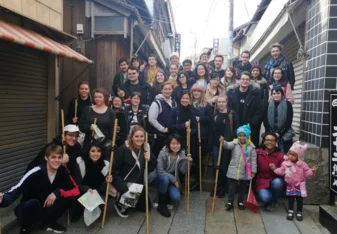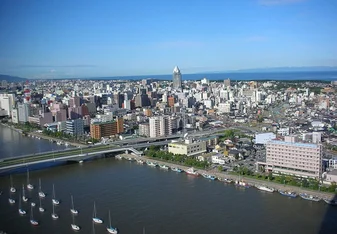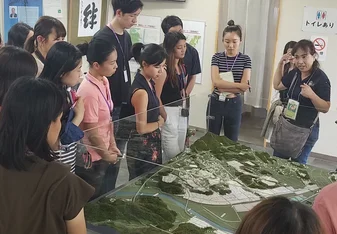How to Study Abroad in Japan in English
If you're an English speaker preparing to study abroad in japan, we've got you covered! Read our tips to help you prepare for your adventure abroad.

In early 2019, Go Overseas named Japan as the top study abroad destination in the world, and it’s easy to understand why. Whether it’s the spellbinding anime films of Studio Ghibli, an exhibition of Hokusai woodblock paintings, or your local all-you-can-eat sushi buffet -- there’s something captivating about Japanese culture that makes Japan a dream study abroad destination for many students. Did I mention? Even if you don’t speak Japanese, you can totally study abroad in the land of the rising sun in English. Here’s how.
First, expectations are on your side. The great part about Japan is that most Japanese people don’t expect you to speak Japanese. (Honestly!) If you managed to squeak out a few sentences before the end of your study abroad, I guarantee at least one person will compliment you on your Japanese.
Most Japanese people are thankfully very friendly, understanding, and will offer to help you if you’re lost or struggling to buy milk, despite the language barrier. All you need is a sense of curiosity, a willingness to explore, and Google Translate.
For years, I had wanted to visit Japan but was very intimidated because I didn’t speak any Japanese. Sure, I’d memorized a few words, read a few books about it, but really wasn’t comfortable speaking or reading in Japanese. Luckily, I learned that even without being fluent, there are still many study abroad avenues that will give you a rich experience, let you see a lot of the country, and make meaningful relationships while you’re there.
And actually, even though my study abroad program in Japan was tailored for students who didn’t speak very good (or any) Japanese, by the end of my summer there, I was much more comfortable speaking Japanese than ever before. Based on my experience, here’s a guide to help you fulfill your dreams of studying abroad in Japan, in English.
Find Study Abroad Programs in English
Don’t speak Japanese? Don’t worry. The wonderful part about Japan’s new-meets-old culture is that English has widely been embraced by the nation. You want to learn about Japanese culture, and they want to teach you!
Not only is it possible to do entire undergraduate degrees in English in Japan, but there are a lot of other ways studying in Japan can happen in English, whether it’s through a university exchange or an English-language summer camp for teens in Tokyo.
If you’re wondering, the cost of studying abroad in Japan in English is comparable to studying in Western Europe. Some academic programs even have scholarships to make it more financially viable.
Here are the three most popular methods of studying abroad in Japan in English: university-led programs, direct enrollment through a Japanese university, and third-party study abroad programs.
University-Led Programs & Exchanges
Your college's study abroad office is a wealth of information. The very first thing you should do is sit down with your advisor and see if they have opportunities available to study abroad in Japan. Most universities running study abroad programs and exchanges with partner institutions allow students to experience life abroad while earning credits that transfer back seamlessly to their degrees. If going through your university, it’s always worth checking to see if there’s a scholarship available for your study abroad path. The earlier you check, the better!
As an undergraduate English Media student at Bishop’s University, I spent a semester abroad at Yamaguchi Prefectural University in Japan studying Japanese Culture and Anthropology. There were about 10 other foreign exchange students with me from around the world living in our neighborhood, and together we would go on weekend trips to local landmarks like Kintai bridge in Iwakuni, or Japan’s old capital city, Kyoto. We would also attend the local festivals together with our Japanese classmates, and generally just enjoyed the heck out of being a young, 20-something in a beautiful city.
I made lifelong friends, saw a lot of Japan, and earned 8 credits towards my undergraduate degree. All on scholarship through my university, to boot.
Check with your university's study abroad office to find what adventures await you.
Direct Enrollment Through a University in Japan
If you're not happy with your school's official study abroad program offerings, consider enrolling in a program hosted at a university in Japan. Might as well go right to the source, right?
The legendary Tokyo University ‘Todai’ has a number of undergraduate and graduate programs available in English. This is the real-life school so many fictional anime and manga characters are always trying to get into!
Third-Party Study Abroad Provider Programs
If you want support, security, and a whole lot of extras, consider going overseas with a study abroad provider. There are many reputable, highly-rated companies available to walk you through every step of the study abroad journey. The extra support these companies provide in English can give you a lot of peace of mind that they can handle any problems that might arise in Japan from the language barrier.
Some of the programs are eligible for college credit, and some are more geared towards delivering an enriching cultural experience. It’s worth checking in with your school to see which might fit your needs.
The nice thing about third-party study abroad providers is that they often have regular cultural outings, like Japanese tea ceremonies, culinary explorations, or other facilitated activities.
You can sometimes find scholarships and grants to help offset costs, but generally speaking, these options are more expensive than a university-led exchange. But, they also have the widest range of programs, and the ability to be custom-tailored to exactly your needs, like if you only want to study abroad for four weeks, instead of an entire semester.
Choose Your Location Wisely
Getting by without English in Japan is doable, but it will likely be much easier if you’re living in a big city. In places like Tokyo and Kyoto that see more tourists, there’s a lot more infrastructure for navigating day to day life in English. Cities also tend to have larger expat communities, so if you’re looking to hang out with other English speakers, it’s much easier to do in a place like Tokyo.
That being said, Tokyo can also be overwhelming. Tokyo’s metropolitan area is more than 800 square miles and is home to more than 9 million people. Because there are more expats here, it can also be easy to case yourself off in a little English bubble instead of getting to know the new Japanese people around you.
Smaller cities like Fukuoka or Yamaguchi are also wonderful places to explore Japanese culture, but you'll find less English signs, and you may find yourself using more hand gestures and translation apps at the grocery stores. Hey -- learning how to play charades is a great skill!
That being said, it’s a relatively small country, and nothing is too far away with the benefit of bullet trains, and quick domestic flights if you want to explore another corner of the country on your weekends.
It’s very conceivable that in one weekend you could be strolling through the Golden Pavilion temple grounds in Kyoto one morning, then grabbing a matcha ice cream and board the shinkansen to be in Tokyo Disneyland later that night.
Even though Japan is small, each region its own quirks and hallmarks. If you want to see a traditional Japanese farming town, you can visit the tea paradise of Wazuka. If you want to practice karate, then the southern islands are where it’s at. Interested in political history? Visit Hagi, where many of Japan’s statesmen and politicians were raised. Or, visit Hiroshima, where the beautiful and eerie The Atomic Bomb Dome and Hiroshima Peace Memorial Museum and Park will make you think about the past, and inspire you to hope for the future.
Here are a few city profiles of what it’s like to live and study in a Japanese city.
Do Some (Food) Research Beforehand
While Japan's culinary offerings are largely delicious, there are a few things on the menu that might not sit well with your stomach on the first try. You may not be a fan of their mucilaginous fermented soybeans -- nattou --, or the thought of raw fish might make your stomach turn.
Doing a little research into some of the country's staple dish names can save you a lot of anxiety when your class or host family heads out to a restaurant. It's also always a good idea to research the names of any foods you're allergic too and save them somewhere you can easily reference. Even if it's just a note on your phone. Even better, have someone who speaks Japanese write it down on an index card for you, so you can show the server at your restaurant.
No matter where you study or visit in Japan be sure to experience the food no other country does better -- the egg salad sandwich.
I’m serious. Check out Anthony Bourdain’s quest for the pillowy-soft egg sandwich at the legendary Lawson's convenience store. Of course, you should probably also try the okonomiyaki, teppanyaki, adzuki sweets, or the sweet guts of a sea urchin plucked from the sea by a diver who could be my grandmother -- In time, you’ll discover your own favorite Japanese comfort food.
Find Your English Advocates

Depending on your study abroad path, there might also be a lot of resources available to you in the form of classmates, teachers, mentors, or host families who speak English.
For example: when I was living in Yamaguchi we had a teacher who was the head of the exchange student program who was fluent in both English and Japanese. When I got sick and had to go to the doctor, he came with me and was able to act as interpreter between myself and the hospital staff. Having people like that who can help you is invaluable.
It’s worth asking your program coordinator before you go if there will be someone like that on the ground who can help you and is accessible on a day to day basis if you need something.
Take Japanese 101
Even though you’ll be entering an English study-abroad program, there’s no denying that having even a little bit of familiarity with the language will make the entire study abroad process seem a lot less daunting.
Let’s face it: Japanese is hard. It doesn’t use the Roman alphabet, has a totally different grammatical structure, and even if you’re a lingo-savvy polyglot, it can still be pretty intimidating. When I was first learning, Japanese felt like a set of gilded gates, behind which everyone I knew was having the most fabulous sushi buffet party. Luckily, I didn’t let that stop me.
The year before I went, I took an intensive, 8-week summer semester Japanese program at my university. It didn’t make me fluent, but it helped a ton in that I basically understood how Japanese worked and could read the two phonetic writing systems -- hiragana and katakana.
While my program was very much geared towards students who didn’t speak a lot of Japanese, there was a 100-level Japanese for foreign speakers class that I took along with my other classes that helped me immensely. It was kind of hilarious because there were only 2 or 3 of us in the class at any given time (it was a small prefectural university), but at least we got a lot of practice. By the time I left, I still wasn’t fluent, by any means, but it gave me a lot of joy and added context and meaning to my day-to-day interactions with Japanese friends and teachers.
If enrolling in a university, be sure to ask if there’s a basic Japanese course you can take.
Find a Japanese Language Partner

Another tactic you can try is finding a language partner! Language partners are a great way to make friends and practice cultural exchange. Typically, it works like this:
You -- the English speaker -- are trying to learn Japanese. Your partner -- the Japanese speaker -- is trying to learn English. You’ll meet up at a coffee shop, restaurant, book store, or other meeting space for maybe an hour or so each week, and first you’ll have a conversation for 30 minutes in English, and then 30 minutes in Japanese, or vice versa. It’s basically a low stakes chat that get you used to speaking in your target language.
This is a fantastic way to learn some conversational Japanese if you don't want to enroll in a formal course or can't for some reason.
Studying in Japan in English is the perfect gateway to exploring Asia. You’ll be able to keep up with your classes, have the option of cultural immersion, and be able to explore one of the world’s most dynamic countries.
If you can see yourself walking through ancient temples, enjoying the art of ‘forest bathing,’ reviewing Japanese culture notes with new classmates, and celebrating the end of exams with a trip to a tabehodai (all you can eat) restaurant, then Japanese-speaking or not, you should definitely fit Japan into your academic plans! If you’ve ever dreamed of it, there’s no question you should study abroad in Japan.






